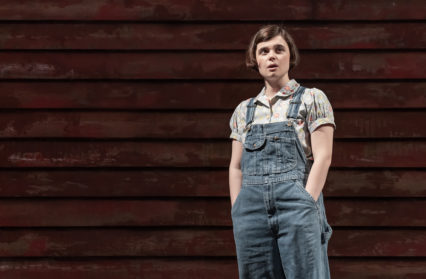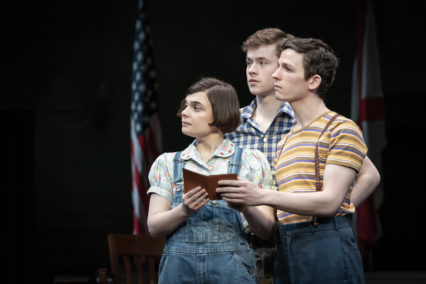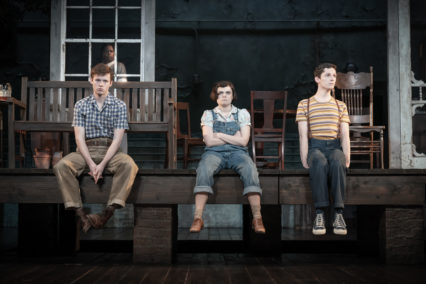Aaron Sorkin’s stage adaptation of To Kill a Mockingbird is currently in its ninth month at London’s Gielgud Theatre. Based on Harper Lee’s globally best-selling novel depicting small-town, depression-era Alabama, its poignant yet clear-eyed examination of human nature has cemented Mockingbird’s place as a classic. Cerith Mathias caught up with Gwyneth Keyworth, who has just completed her run as Scout Finch, to discuss why Harper Lee’s work is still so relevant today and how Keyworth’s childhood in Wales prepared her for the iconic role.
Cerith Mathias: To Kill a Mockingbird was published back in 1960, with the story itself set in the 1930’s. What do you think makes it relevant to today’s audiences?
Gwyneth Keyworth: Harper Lee’s book is looking back at her childhood and I think that everyone can experience that thing of coming of age or trying to work out what the world is. I think that’s a universal theme. But I think in our version ofTo Kill a Mockingbird, what Aaron Sorkin has particularly tried to draw attention to is the trial of Tom Robinson, which is the wrongful accusation of rape that a black man faces and then his wrongful murder under police custody, which, sadly, looking at the world today with things like George Floyd or even much closer to home, like the issue in South London recently with Chris Kaba, it is something, very sadly, that we are still facing today. This shouldn’t still be happening, but it is. And I think this play is trying to bring that to the fore. Harper Lee was talking about an injustice that sadly, still exists today. And that’s why it’s still so relevant.
Cerith Mathias: Do you think the play, and the novel itself have a place in the current discourse around those big issues?
Gwyneth Keyworth: I hope so. You know, it’s easy to go, ‘Oh, that was America back then,’ but actually look at the news, it’s happening right now. So I think that it’s a big lesson, particularly, and I say this as a white person, for white people to take on board that we have culpability in this. In the play, Atticus thinks that the community is better than this. He thinks they’re post racism, and actually, I think a lot of us even in the UK thought after BLM, maybe we’re post racism, but then you see things like Chris Kaba, and it’s a reminder we are not. We’ve got to hold ourselves accountable, we have got to do better because we are killing our humanity and we are being afforded the privilege of forgetting about it, because we’re white. It’s up to us, it’s up to people like Atticus and people like Scout to really step up and do something different.
Cerith Mathias: The play is very faithful to the book in many ways, but one difference is a shift in emphasis on the voice afforded to some of the characters – namely Calpurnia, Tom and Dill. How important is that?
Gwyneth Keyworth: Aaron Sorkin is emphasising what was already there. Harper Lee already had it ingrained in the text. When it comes to Dill for example, through his character, we explore the experience of being othered because of your sexuality at a really young age. We’ve all grown up with a kid in school on the playground, maybe it was you, that somehow either felt different or didn’t act in typically masculine or typically feminine ways and was told to institutionalise because being out of the status quo is deemed as wrong. Harper Lee based Dill on her friend Truman Capote, who was a queer writer at that time and so that was already there; Aaron Sorkin emphasised it more. And there’s a scene where it was really important to see Calpurnia directly challenge Atticus on his views. There’s a line in the play where Atticus says, “I believe in respect,” and Calpurnia responds with, “No matter who you’re disrespecting by doing it?” I think that’s an important argument to have, you know, we can all believe in fairness and goodness, but who are we hurting in the process?
I think for today’s audience, you can’t really do a production of To Kill A Mockingbird, without bringing that to the fore, making that more important. Going forward, it will be interesting to see a version of To Kill a Mockingbird maybe from Tom Robinson’s point of view or Tom Robinson’s kids, I think that would be a really exciting thing to see in the future. This version is still based on what Scout sees and Atticus’ point of view, and I think that’s an opportunity for audiences to be guided into very big subjects that are already prevalent today.
Gwyneth Keyworth (Scout Finch), Harry Redding (Jem Finch), David Moorst (Dill Harris) – photo by Marc BrennerCerith Mathias: Scout is one of the most famous characters in literature. What’s it like playing her?
Gwyneth Keyworth: It’s quite magic really. When I heard there were auditions going for this, I begged my agent, I was like, ‘You’ve got to get me in!’ I remember the first time they said they’d already started closing in on the auditions and they were sorry, but the window was gone and I was like, ‘I don’t care, ask again! Ask again because I am that girl.’ I really resonated with her. I think a lot of that, actually, is growing up in Wales.
There are similarities in the fact that Harper Lee’s book is set in Maycomb, a fictional town in the middle of nowhere, Alabama, and I think coming from a village just south of Aberystwyth in west Wales I recognise a lot of the culture in terms of telling stories and the importance of family values and I recognise the limitations of that.
Growing up as a kid that was dyslexic, and I’m dyspraxic, which are now official terms for stuff, but at that time, it meant to the world, what they saw was someone that was messy, that was bad at keeping time, who never could remember her homework and my school years were tough, because it meant that everyone was like, ‘well, you’re just being lazy.’ And it’s like, ‘oh, no, actually, [as I realised] in later life, I’ve got a learning disability.’ But it meant that at times, it was tough. I knew that I wasn’t stupid, but everyone was telling me, ‘Well, why can’t you get A’s?’ and in Welsh culture education is very important. So, I think I recognised myself in that feeling of being slightly other, or not being able to fit in with the status quo.
It’s lovely to be able to play someone that people love so much, who’s so brave. That’s what I love about Scout, that regardless of the fact that the world is always telling her to be more like a girl, you know, ‘why are you such a tomboy?,’ she proudly defies them. I think that’s something that all young people can see themselves in.
Cerith Mathias: Does she feel quite a powerful character to play?
Gwyneth Keyworth: Yeah massively. I think it’s rare that you get to play a woman with such agency at such a young age. Someone that really challenges the status quo, who in Aaron Sorkin’s version, isn’t straightforward. There are shades of her that are more complicated. She’s a young person that is dealing with gender identity and trying to work out a space in the world. Aaron Sorkin has been brilliant at making that seem so simple. When you talk about it in terms of gender identity, it sounds very complicated, but when you experience it in the play, I think that’s what’s brilliant about his writing – he makes it so universal. It’s brilliant, I love it.
Cerith Mathias: How did you prepare for the role? Were you already a big fan of the book?
Gwyneth Keyworth: I didn’t read it growing up. Being dyslexic, I wouldn’t say that reading has been my forte, but I read it later on. My sister read it and said, ‘You should read this book. The lead character reminds me of you as a kid.’ So then I read it when I was in my early 20s. In terms of preparation, I actually spent a lot of time digging up old pictures of me as a kid in my full tracksuit! You do your research in terms of the history of America. There are specifics about Scout that are different from me, you know, learning about Jim Crow laws, learning about the Civil War and learning what that meant, and American politics. We were really lucky to have a lecturer from Manchester University come and
talk to us about American history from independence to the present day to give us an overview, but specifically, he spoke about the black American experience. So that we could really root ourselves in the knowledge of that and what that meant. And I watched interviews with Harper Lee, because Scout is based on her. I wanted to try and see who she was and see what she was exploring of herself through the character of Scout.
Harry Redding (Jem Finch), David Moorst (Dill Harris), Gwyneth Keyworth (Scout Finch), background Pamela Nomvete (Calpurnia) – image by Marc BrennerCerith Mathias: There is certainly a lot packed into one play. What is the one thing you’d like the audience to take away from it?
Gwyneth Keyworth: I’d like them to reflect on us as a society by and large, because I think that Atticus represents us all in certain ways – in that we have good intention, but maybe don’t execute it and are maybe not listening enough to black communities in terms of the struggles that they face. And I think that rather than be defensive about it, we should be like Atticus, you’ve got to learn a bit more and listen harder. I’d love for audiences to be reminded of humanity in all its glory and horror. And I’d like for people to think twice before you just go along with the status quo, because actually, there’s something great about fighting for what’s good, even if it’s a bit of a discomfort for you personally.
Cerith Mathias: Powerful messages. Finally, the novel To Kill a Mockingbird has been translated into 40 different languages throughout the world, yet there’s no Welsh language translation. Do you think it’s time for one?
Gwyneth Keyworth: I think it’s time. I think it’d be tricky to do a Southern American accent in Welsh, I’ll say that! I think there are themes from the book that would translate beautifully into Welsh, Harper Lee’s language is brilliant and her storytelling is magnificent. Definitely, I think children in Wales and people of all ages in Wales would benefit from having the book in Welsh as well.
To Kill a Mockingbird is currently playing at the Gielgud Theatre in London. Tickets are available here.












